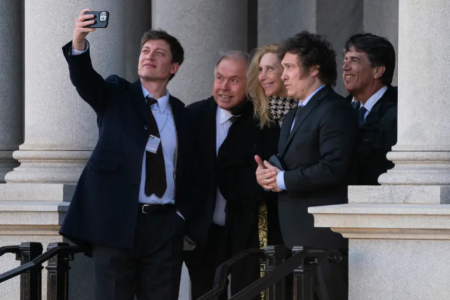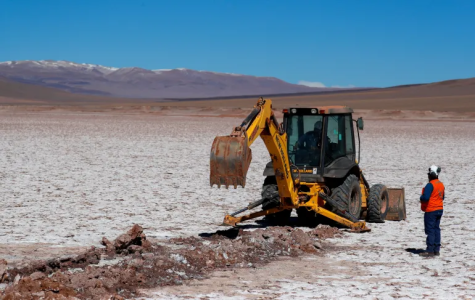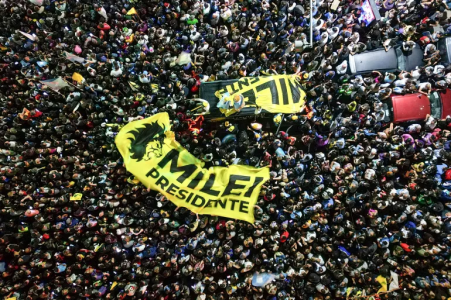Peterpan
New member
Changing course: How Javier Milei will transform Argentina’s foreign policy
December 8, 2023
President-elect Milei will seek to align Latin America’s third largest economy with the US, Israel and ‘the free world’.

President-elect Javier Milei, right, meets with Jewish leaders in the New York borough of Queens on November 27
Buenos Aires, Argentina – Days after clinching Argentina’s presidential race, self-described anarcho-capitalist Javier Milei arrived on the steps of the White House, ready to meet with a top national security adviser for the United States.
His whirlwind trip to Washington, DC, was more than a victory lap, though. It signalled Milei’s plans for a grand realignment of Argentina’s foreign policy — towards the US and Israel and away from China and leftist regional partners.
That shift could make Argentina something of an oddity in Latin America. As the region attempts to shake off Cold War-era divisions, experts warn that Milei may embrace stark political divides between right and left.
“What we saw in the campaign was a candidate with very strong, very intense ideological convictions, with a rhetoric that in a way was reminiscent of the Cold War, talking about communist countries,” said Tomás Múgica, a political scientist and professor of international relations at the Catholic University of Argentina.
As a candidate, Milei assailed China, a top destination for Argentina’s agricultural exports, comparing the country to an “assassin” and saying its citizens were not “free”. He even threatened to freeze relations with the country over its Communist Party rule.
Milei also traded barbs with Brazil’s left-leaning president, Luiz Inácio Lula da Silva, whom he labeled an “angry communist” and “corrupt”. Brazil is Argentina’s single largest trading partner.

President-elect Javier Milei, second from right, poses for a selfie with his team after a November 28 visit to the White House in Washington,
Radical ideas for revamping Argentina’s beleaguered economy have long been Milei’s stock-in-trade. He campaigned on dissolving the country’s Central Bank and ditching the Argentine peso in favour of using the US dollar as currency, in an effort to rein in runaway inflation.
But critics say Milei’s domestic ambitions may be curtailed by his party’s modest presence in the National Congress. In foreign policy, however, Milei is expected to have more sway. Once he takes office on Sunday, the foreign affairs ministry will answer directly to him.
Early signs indicate Milei may be willing to make good on his campaign bluster.
Last week, Milei’s pick for foreign minister, Diana Mondino, confirmed that Argentina would not enter BRICS, a bloc of emerging economies named for its five members: Brazil, Russia, India, China and South Africa. Argentina was set to join on January 1.
That decision was a “slap in the face” to China and Brazil, according to Jorge Heine, a Boston University professor and former Chilean ambassador to China. Both had supported Argentina’s entry into the group.
But while Milei’s presidency will be a setback to Argentina’s relationship with those two countries, Heine predicts it will give “a new boost to the global far-right movement”.
Here are three key shifts in foreign relations expected under Milei:

China is a major investor in Argentina’s lithium sector, something that could be imperiled by strained relations
Re-evaluating relations with China
At the end of a visit to China this year, Economy Minister Sergio Massa — Milei’s left-wing rival for the presidency — joked that his country should be renamed “Argenchina”.The quip illustrated the close ties the outgoing government has cultivated with Beijing.
In the last half-year alone, Argentina joined China’s Belt and Road Initiative, an overseas investment programme, and expanded a currency swap deal that has helped prop up its economy.
China is Argentina’s second biggest trading partner and a major investor in its energy and lithium sectors. But Milei’s hardline rhetoric could put those relationships in peril.
“Provoking the Chinese is not a good idea,” Heine said. “It has consequences.”
Milei’s camp has argued Argentina can unspool its diplomatic ties with China while avoiding a negative impact on its export industry. But Heine is sceptical.
“It’s an illusion to think you can lack political relations but still have economic relations,” he said. “In China’s case, it doesn’t work like that.”
During a news briefing after Milei’s election, the Chinese Ministry of Foreign Affairs warned Argentina that severing ties would be a “serious mistake”.
And Argentina has already experienced blowback to measures it has taken against China in the past. In 2010, when its government accused China of undercutting anti-dumping rules — designed to maintain fair pricing in international trade — China responded by banning the import of soybean oil from Argentina, a crucial blow to its economy.
A Milei government could provoke similar retaliation if it takes strong action against China.
Ariel González Levaggi, an executive board member at the regional think tank CRIES, said Milei may, for example, pull government support from controversial infrastructure projects financed with Chinese funds. Critics have claimed that some of the projects, including a Chinese military-run space station, compromise Argentine sovereignty.
By and large, though, experts expect Milei to follow the example of Brazil’s former far-right President Jair Bolsonaro, who also talked tough on China but largely maintained the status quo.
Already, Milei has softened his rhetoric, publicly thanking Chinese leader Xi Jinping on social media for a letter of congratulations after the election.
“I send you my most sincere wishes for the wellbeing of the people of China,” Milei wrote back.

Supporters of Javier Milei celebrate his election victory on November 19
A full-throated embrace of the US
Milei’s predecessor, President Alberto Fernández, was elected in 2019. He came to power as part of a “pink tide”: a wave of left-wing leaders sweeping across Latin America.Many members of the “pink tide” rejected US efforts to shape policy in the region, instead seeking alternatives — like China — to American leadership and economic might.
But Milei is expected to break with that trend. On the campaign trail, he repeatedly said he would pursue a foreign policy aligned with the US and the “free world”.
That would be a “great opportunity” for the US, González Levaggi said.
“There will be a government that is declaring itself openly to be a friend of the US. That’s not something that usually happens” in Argentina, he explained.
Milei’s pledge to rein in government spending is likewise expected to resonate with US officials, who see stability in Latin America as a boon to their interests.
“Basically, the US doesn’t want Argentina to become a problem,” Múgica, the political scientist, said.
“The US looks for stability in Argentina because, at the end of the day, it’s a democratic partner, it’s an exporter of foodstuffs on a global scale, and it could become an important player in the energy sector.”
For his part, Milei looks to the US as a pillar of his economic agenda. The US is the International Monetary Fund’s largest shareholder, and Milei will need its help to get a $44 billion loan programme back on track.
With his wild hair, larger-than-life personality and thin political resume, Milei has also evoked comparisons to right-wing US leaders like Donald Trump.
But Múgica said Milei’s recent trip to Washington sends a message that he and his allies are willing to cooperate with Democrats as well as Republicans.
“They tried to show that they can get along well with [Democrats] and that they are not simply Trump copycats in Latin America,” he said.

Then-candidate Javier Milei lifts up an Israeli flag during a campaign rally in Lomas de Zamora, Argentina, on October 16
A high point for Argentina-Israel relations
The election that brought Milei to victory took place against the outbreak of war in Gaza, a narrow Palestinian territory along the Mediterranean Sea.On October 7, the Palestinian group Hamas led an attack against Israel, killing 1,200 people and taking hundreds more captive. Israel responded by launching a military offensive against Gaza.
More than 16,000 Palestinians have been killed in the months since, with United Nations experts warning of a “grave risk of genocide”.
The dire humanitarian crisis in Gaza has prompted Latin American leaders to issue strong criticism of Israel’s tactics. Brazil’s Lula called the military offensive a “genocide”. His counterpart in Colombia, fellow leftist Gustavo Petro, called it a “massacre”.
No such criticism has come from Milei, though. Rather, in the final weeks of his campaign, he was known to wave the Israeli flag at campaign rallies. His fervent support will likely make his administration Israel’s top ally in the region.
“In Latin America, many countries like Brazil, Chile, Colombia, Bolivia and Mexico have strongly criticized Israel,” Heine, the former Chilean ambassador, said. Milei’s stance “is a dissonant position”.
His embrace of Israel puts him more in line with leaders from North America and Europe, many of whom have backed Israel’s military campaign, Heine explained. “There’s been an important fissure created between the global north and the global south.”
Milei has promised to follow in Trump’s footsteps and move his country’s embassy in Israel from Tel Aviv to Jerusalem, a controversial move. The city has been claimed by both Israelis and Palestinians.
He also pledged to declare Hamas a “terrorist organization”. Twenty-one of the captives taken on October 7 were from Argentina.
Argentina’s Jewish community, already the biggest in Latin America, may soon be able to count a president among its number. Milei is in the process of converting. He would become Argentina’s first Jewish head of state.

